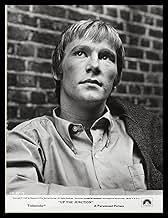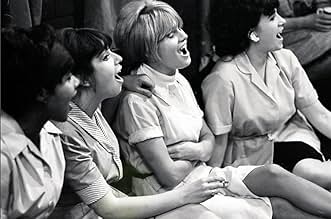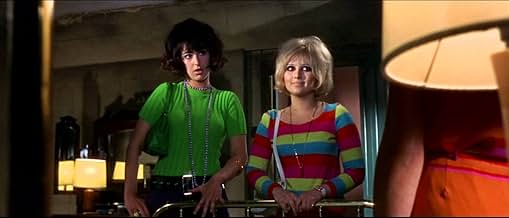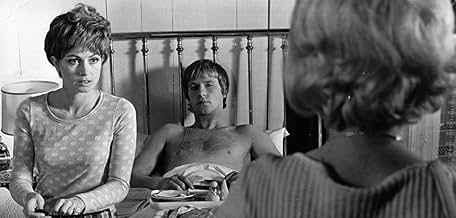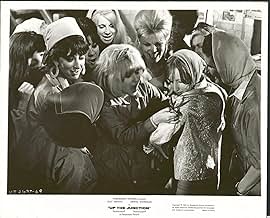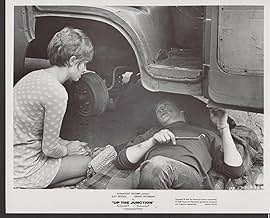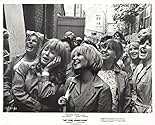IMDb RATING
6.9/10
1.1K
YOUR RATING
Addresses some of the major 60s social issues - a bored rich London-girl from Chelsea decides to go "slumming" in depressed Battersea, getting a flat and starts factory-work and makes friend... Read allAddresses some of the major 60s social issues - a bored rich London-girl from Chelsea decides to go "slumming" in depressed Battersea, getting a flat and starts factory-work and makes friends... of which one has to get an illegal abortion.Addresses some of the major 60s social issues - a bored rich London-girl from Chelsea decides to go "slumming" in depressed Battersea, getting a flat and starts factory-work and makes friends... of which one has to get an illegal abortion.
- Awards
- 1 nomination total
- Director
- Writers
- All cast & crew
- Production, box office & more at IMDbPro
Featured reviews
An absolute must see for all lovers of 1960's culture. Not only does it boast some of the decades finest actors, it has a beautiful soundtrack from Manfred Mann and the cinematography perfectly captures the feel of what it was like to live in that decade. The plotline also deals with some of the pressing social issues of the time as well, including a very sensitive portrayal of back street abortion, the only one coming even slightly close to the masterly "Alfie". Even watching this film now, I think you can really get a feel for what it was like to be young and working class in the 1960's. Great Stuff.
Up The Junction was made during the Summer of 1967 though there isn't much love & peace to be found in this film. Arguably the only likeable characters are Polly, an uptown girl who's trying to slum it in Battersea, and Pete (Dennis Waterman) the 'bit of rough' she falls for, and they're not without flaws. I always loved Dennis Waterman in Minder and his character in this film could easily pass for a young Terry McCann; anyone who doubts his ability as a straight actor should watch the showdown between Pete and Polly in the hotel room. The two sisters Sylvie and Rube are sweet & bubbly on the outside but later on reveal a nasty side, especially when mocking a work colleague who appears to have learning difficulties.
Apart from Pete, all the men are depicted as selfish, sex mad and prone to violence.
Up The Junction came out a few years after the golden age of kitchen sink drama, and maybe lacks their gritty Northern humour, but there's still plenty to recommend including some lovely, sweeping London skylines, nice views of the iconic Battersea power station, and a groovy soundtrack by Manfred Mann. Anyone nostalgic for the late 1960s will probably enjoy it.
Apart from Pete, all the men are depicted as selfish, sex mad and prone to violence.
Up The Junction came out a few years after the golden age of kitchen sink drama, and maybe lacks their gritty Northern humour, but there's still plenty to recommend including some lovely, sweeping London skylines, nice views of the iconic Battersea power station, and a groovy soundtrack by Manfred Mann. Anyone nostalgic for the late 1960s will probably enjoy it.
A portrayal of women's lives in 1960s working class Battersea, through the eyes of a girl from Chelsea, hence an outsider. Based on the better known book by Nell Dunn, from which it departs significantly, making the ill-fated affair with Dennis Waterman's character the central narrative. Beautifully done. Deserves to be better known than it is.
As someone who was born and brought up in Battersea in the 60's and 70's I can certainly attest that the tone of the film is spot-on.
Battersea was then a very working-class and rather depressed district, despite counting the very wealthy areas of Westminster and Chelsea as near neighbors. Today the difference is barely noticeable; then it hit one in the face.
Given the politics of the day, when unions were strong, the Communist Party of Great Britain still had a respectable face, and protests against the Vietnam War were taking place, the idea of a well-off young woman moving to south London to 'see things for herself' is not odd at all. Nowadays of course, it's the done thing to move to run down areas in the hope of seeing property prices rise.....
The film should be appreciated for what it is, a well-acted, involving and accurate snapshot of a less glamorous place and time in "Swinging 60's" London. About as good as you'll get without a time machine.
Battersea was then a very working-class and rather depressed district, despite counting the very wealthy areas of Westminster and Chelsea as near neighbors. Today the difference is barely noticeable; then it hit one in the face.
Given the politics of the day, when unions were strong, the Communist Party of Great Britain still had a respectable face, and protests against the Vietnam War were taking place, the idea of a well-off young woman moving to south London to 'see things for herself' is not odd at all. Nowadays of course, it's the done thing to move to run down areas in the hope of seeing property prices rise.....
The film should be appreciated for what it is, a well-acted, involving and accurate snapshot of a less glamorous place and time in "Swinging 60's" London. About as good as you'll get without a time machine.
Peter Collinson was already mellowing after his directorial debut with the incredibly nasty home invasion film 'The Penthouse' (1967); and let loose on Nell Dunn's stories in Technicolor with Manfred Mann on the soundtrack was obviously going to turn in a very different film from Ken Loach's 'Wednesday Play' of 1965.
What seemed like gritty realism in 1967 today seems as remote as the world evoked by Dickens (complete with Jewish stereotypes which really date it). Maureen Lipman is almost unrecognisably young and it's always good to see Adrienne Posta and Liz Fraser (who share a literally gut-renching sequence after the former has an abortion performed by a drunken Hylda Baker).
But the real star is Battersea power station, looming in the background back in the days when it was still permitted to smoke.
What seemed like gritty realism in 1967 today seems as remote as the world evoked by Dickens (complete with Jewish stereotypes which really date it). Maureen Lipman is almost unrecognisably young and it's always good to see Adrienne Posta and Liz Fraser (who share a literally gut-renching sequence after the former has an abortion performed by a drunken Hylda Baker).
But the real star is Battersea power station, looming in the background back in the days when it was still permitted to smoke.
Did you know
- GoofsWhen Sylvie and Rube are singing in the pub, there are many cutaways which show the pub customers joining in the songs. On most of these, a large piece of dirt is visible at the top of the frame. Someone didn't perform the obligatory "hair in the gate" check before loading the film.
- ConnectionsFeatured in Film Review: Backs British Films (1968)
- SoundtracksUp The Junction (Main Title)
Written by Mike Hugg and Manfred Mann
- How long is Up the Junction?Powered by Alexa
Details
- Release date
- Country of origin
- Language
- Also known as
- Up the Junction
- Filming locations
- Beach Hotel, Marine Parade, Worthing, West Sussex, England, UK(hotel where Pete and Polly stay)
- Production companies
- See more company credits at IMDbPro
- Runtime1 hour 59 minutes
- Sound mix
- Aspect ratio
- 2.35 : 1
Contribute to this page
Suggest an edit or add missing content


